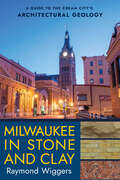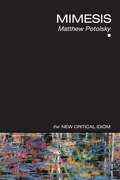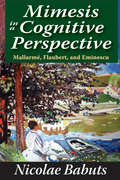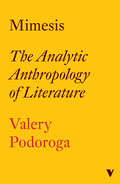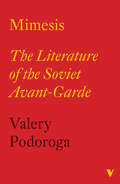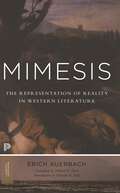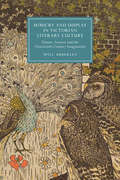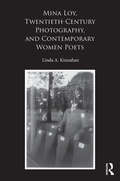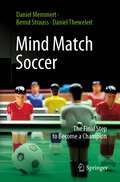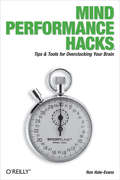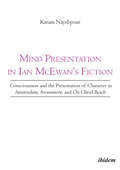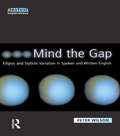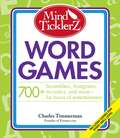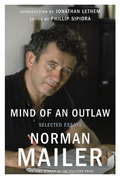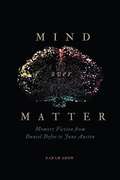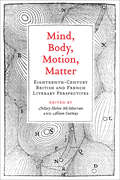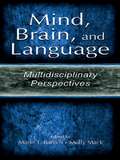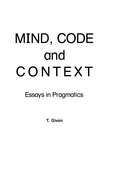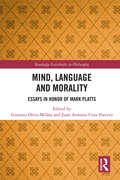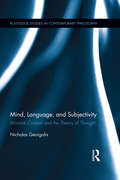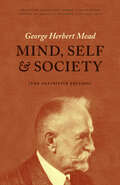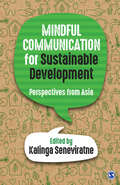- Table View
- List View
Milton’s Visual Imagination
by Stephen B. DobranskiCritics have traditionally found fault with the descriptions and images in John Milton's poetry and thought of him as an author who wrote for the ear more than the eye. In Milton's Visual Imagination, Stephen B. Dobranski proposes that, on the contrary, Milton enriches his biblical source text with acute and sometimes astonishing visual details. He contends that Milton's imagery - traditionally disparaged by critics - advances the epic's narrative while expressing the author's heterodox beliefs. In particular, Milton exploits the meaning of objects and gestures to overcome the inherent difficulty of his subject and to accommodate seventeenth-century readers. Bringing together Milton's material philosophy with an analysis of both his poetic tradition and cultural circumstances, this book is a major contribution to our understanding of early modern visual culture as well as of Milton's epic.
Milwaukee in Stone and Clay: A Guide to the Cream City's Architectural Geology
by Raymond WiggersMilwaukee in Stone and Clay follows directly in the footsteps of Raymond Wiggers's previous award-winning book, Chicago in Stone and Clay. It offers a wide-ranging look at the fascinating geology found in the building materials of Milwaukee County's architectural landmarks. And it reveals the intriguing and often surprising links between science, art, and engineering. Laid out in two main sections, the book first introduces the reader to the fundamentals of Milwaukee's geology and its amazing prehuman history, then provides a site-by-site tour guide. Written in an engaging, informal style, this work presents the first in-depth exploration of the interplay among the region's most architecturally significant sites, the materials they're made of, and the sediments and bedrock they're anchored in. Raymond Wiggers crafted Milwaukee in Stone and Clay as an informative and exciting overview of this city. His two decades of experience leading architectural-geology tours have demonstrated the popularity of this approach and the subject matter.
Mimesis (The New Critical Idiom)
by Matthew PotolskyA topic that has become increasingly central to the study of art, performance and literature, the term mimesis has long been used to refer to the relationship between an image and its ‘real’ original. However, recent theorists have extended the concept, highlighting new perspectives on key concerns, such as the nature of identity. Matt Potolsky presents a clear introduction to this potentially daunting concept, examining: the foundations of mimetic theory in ancient philosophy, from Plato to Aristotle three key versions of mimesis: imitatio or rhetorical imitation, theatre and theatricality, and artistic realism the position of mimesis in modern theories of identity and culture, through theorists such as Freud, Lacan, Girard and Baudrillard the possible future of mimetic theory in the concept of ‘memes’, which connects evolutionary biology and theories of cultural reproduction. A multidisciplinary study of a term rapidly returning to the forefront of contemporary theory, Mimesis is a welcome guide for readers in such fields as literature, performance and cultural studies.
Mimesis in a Cognitive Perspective: Mallarme, Flaubert, and Eminescu
by Nicolae BabutsMimesis is a critical and philosophical term going back to Aristotle. It carries a wide range of meanings, including imitation, representation, mimicry, the act of expression, and the presentation of self. In modern literary criticism, mimesis has received renewed attention in the last two or three decades and been subject to wide-ranging interpretations. Nicolae Babuts looks at the concept of mimesis from a cognitive perspective. He identifies two main strands: the mimetic relation of art and poetry to the world, defined in terms of reference to an external reality, and the importance of memory in the making of plots or storytelling.Babuts suggests that there is a material identity we cannot know beyond the limits of our senses and intellect and a symbolic or coded identity that is processed by memory. All writers, including Mallarme in his esoteric poetry, Flaubert in his realist narratives, and Mihai Eminescu, the Romanian poet, in his romantic poems, rely on mimetic strategies to link the two identities: the images in memory to the outside reality. All order their narratives in accordance with the dynamics of memory. Babuts describes this phenomenon with great insight, showing how new traditions are formed.
Mimesis: The Analytic Anthropology of Literature
by Valery PodorogaGround-breaking work of philosophy and Russian Literature: translated for the first timeValery Podoroga was one of the most important thinkers of his generation. Here his most famous work is translated into English for the first time. In it he gives a panorama view of Russian writing, focusing in on the work of Nikolai Gogol, Fyodor Dostoevsky and Andrei Bely. He identifies these authors as pioneers in creating an 'other literature'. This constituted a new form of mimesis or vision of the world, in opposition to the Imperial and national myths.In Mimesis Podoroga develops and elaborates his analytic anthropological approach on these authors with startling effect, excavating the identities and forms of Russian literature, and society. He places an emphasis on how a literary work is a process of world building: both internally by creating a fictive world, but also how it reflects the wider world in which it was produced, and the power with which it changes the world. Finally, the literary work&’s ability to exist in a time that is other than its own time, a time where it does not have a contemporary reader and an author who exercises his will, but where it nonetheless continues to mean something.Mimesis is rightly seen as the masterwork of one of the world's leading literary thinkers.
Mimesis: The Literature of the Soviet Avant-garde
by Valery PodorogaThe politics of literature in the construction of worldsThe Russian Revolution was a literary as well as political upheaval. With a focus on the revolutionary works of Andrei Platonov and the futurist collective Oberiu, leading Russian literary thinker Valery Podoroga shows how profoundly the Soviet experiment overturned the traditional expectations of fiction and poetry. The production of this groundbreaking new work was inextricably interwoven with the political and historical debates of the time.This volume expands on Podoroga&’s critical exploration of the analytic anthropology of literature. Here he delves into the ways literature can be used in &‘world-building&’, both in terms of what happens inside the narrative and how it reflects the external world. He explores the function of the work outside of its time: both as a means to project itself into the future and as a document of a former age. How are we to read the past through these works of the imagination?With an introductory essay from the author&’s daughter, Ioulia Podoroga.
Mimesis: The Representation of Reality in Western Literature - New and Expanded Edition (Princeton Classics #1)
by Edward W. Said Erich AuerbachThe classic book that has taught generations how to read Western literatureMore than half a century after its translation into English, Erich Auerbach&’s Mimesis remains a masterpiece of literary criticism. A brilliant display of erudition, wit, and wisdom, his exploration of how great European writers from Homer to Virginia Woolf depict reality has taught generations how to read Western literature.A German Jew who was forced out of his professorship at the University of Marburg in 1935, Auerbach left for Turkey, where he taught in Istanbul. There he wrote Mimesis, publishing it in German after the war. Displaced as he was, Auerbach produced a work of great erudition that contains no footnotes, basing his arguments instead on searching, illuminating readings of key passages from his primary texts. His aim was to show how, from antiquity to modernity, literature progresses toward ever more naturalistic and democratic forms of representation. Ranging over works in Greek, Latin, Spanish, French, Italian, German, and English, Auerbach uses his remarkable skills in philology and comparative literature to present an optimistic view of Western history and culture and to refute any narrow form of nationalism or chauvinism.This expanded Princeton Classics edition of Mimesis includes a substantial introduction by Edward Said as well as an essay in which Auerbach responds to his critics.
Mimicry and Display in Victorian Literary Culture: Nature, Science and the Nineteenth-Century Imagination (Cambridge Studies in Nineteenth-Century Literature and Culture #123)
by Will AbberleyRevealing the web of mutual influences between nineteenth-century scientific and cultural discourses of appearance, Mimicry and Display in Victorian Literary Culture argues that Victorian science and culture biologized appearance, reimagining imitation, concealment and self-presentation as evolutionary adaptations. Exploring how studies of animal crypsis and visibility drew on artistic theory and techniques to reconceptualise nature as a realm of signs and interpretation, Abberley shows that in turn, this science complicated religious views of nature as a text of divine meanings, inspiring literary authors to rethink human appearances and perceptions through a Darwinian lens. Providing fresh insights into writers from Alfred Russel Wallace and Thomas Hardy to Oscar Wilde and Charlotte Perkins Gilman, Abberley reveals how the biology of appearance generated new understandings of deception, identity and creativity; reacted upon narrative forms such as crime fiction and the pastoral; and infused the rhetoric of cultural criticism and political activism.
Min and Fin (Word Family Readers)
by Liza CharlesworthMin and Fin are twins! Meet them both in this terrific tale that teaches lots and lots of -in words.
Mina Loy, Twentieth-Century Photography, and Contemporary Women Poets
by Linda A. KinnahanIn Mina Loy, Twentieth-Century Photography, and Contemporary Women Poets, Linda A. Kinnahan explores the making of Mina Loy’s late modernist poetics in relation to photography’s ascendance, by the mid-twentieth century, as a distinctively modern force shaping representation and perception. As photography develops over the course of the century as an art form, social tool, and cultural force, Loy’s relationship to a range of photographic cultures emerging in the first half of the twentieth century suggests how we might understand not only the intriguing work of this poet, but also the shaping impact of photography and new technologies of vision upon modernist poetics. Framing Loy’s encounters with photography through intersections of portraiture, Surrealism, fashion, documentary, and photojournalism, Kinnahan draws correspondences between Loy’s late poetry and visual discourses of the body, urban poverty, and war, discerning how a visual rhetoric of gender often underlies these mappings and connections. In her final chapter, Kinnahan examines two contemporary poets who directly engage the camera’s modern impact –Kathleen Fraser and Caroline Bergvall – to explore the questions posed in their work about the particular relation of the camera, the photographic image, and the construction of gender in the late twentieth century.
Mind Match Soccer: The Final Step to Become a Champion
by Daniel Memmert Bernd Strauss Daniel TheweleitClose soccer matches and tight title fights are rarely decided by players' technical skills or their coaches' tactical measures. The most significant impetus comes from an area that is often mentioned but difficult to grasp: mental strength, personality, and team cohesion after special victories. Using current scientific knowledge and illustrated by many examples, this book describes the mental and cognitive processes that determine victory and defeat in soccer. Several interviews with well-known soccer coaches, managers and former players complement these findings from psychology and sport science.It deals with phenomena such as the home field advantage, creativity on the field, extreme emotional situations, the limits of visual perception, group dynamics and modern leadership. Well-known myths (e.g. Don't let the player who has been fouled shoot the penalty) will be discussed and debunked. Every soccer enthusiast should read this book in order to understand which phenomena can genuinely be game-changing and which ones cannot.
Mind Performance Hacks: Tips & Tools for Overclocking Your Brain
by Ron Hale-EvansYou're smart. This book can make you smarter.Mind Performance Hacks provides real-life tips and tools for overclocking your brain and becoming a better thinker. In the increasingly frenetic pace of today's information economy, managing your life requires hacking your brain. With this book, you'll cut through the clutter and tune up your brain intentionally, safely, and productively.Grounded in current research and theory, but offering practical solutions you can apply immediately, Mind Performance Hacks is filled with life hacks that teach you to:Use mnemonic tricks to remember numbers, names, dates, and other flotsam you need to recallPut down your calculator and perform complex math in your head, with your fingers, or on the back of a napkinSpark your creativity with innovative brainstorming methodsUse effective systems to capture new ideas before they get awayCommunicate in creative new ways-even using artificial languagesMake better decisions by foreseeing problems and finding surprising solutionsImprove your mental fitness with cool tricks and gamesWhile the hugely successful Mind Hacks showed you how your brain works, Mind Performance Hacks shows you how to make it work better.
Mind Presentation in Ian McEwan's Fiction: Consciousness and the Presentation of Character in Amsterdam, Atonement, and On Chesil Beach
by Karam NayebpourThis book explores the central fictional minds in three of Ian McEwan's most popular narratives. Mind presentation constitutes the main part of characterization in the second phase of McEwan's writing, where his plot structure depends to a large degree on the presentation of the characters' mental workings. In Amsterdam (1998), Atonement (2003), and On Chesil Beach (2007), the construction process of the fictional minds, the degree their functioning is impacted by their experiences, and the way their mental aspect controls their behavior and relationships are critical to the stories. Relying on insights and methods from cognitive narratology, this study follows two purposes: It firstly analyzes the function of fictional minds and their operational modes in these narratives. Secondly, it explores the impact of the characters' experiences on both their mental functioning and their behavior, especially with view of their relationships. Nayebpour reveals that the plot structure of these narratives highly depends on the lack of a sound balance between the two aspects of the represented minds (intermental/joint thought and intramental/individual thought) as well as on the dominance of the intramental one. The tragic atmosphere in these narratives, Nayebpour argues, is the result of this imbalance.
Mind The Gap: Ellipsis and Stylistic Variation in Spoken and Written English (Textual Explorations)
by Peter WilsonWe rarely speak or even write in the complete sentences that are often held to be the ideal form of linguistic communication. Language is, in fact, full of gaps, because speakers and writers operate in contexts which allow bits of language to be understood rather than expressed. This book systematically analyses this inherent gappiness of language, known as ellipsis, and provides an account of the different contexts, both linguistic and situational, which affect its use. Peter Wilson draws on a wide variety of examples of spoken and written English, and both literary and non-literary to present a comprehensive classification of elliptical language that ranges from the conversational fragment and the advertisement to the dialogue of Shakespeare and imagist poetry. Mind the Gap shows how ellipsis is a feature of major structural and stylistic importance to our understanding of spoken and written language, and will be of interest to undergraduate students of linguistics, literature, communication and the interrelations between them..
Mind Ticklerz Word Games
by Charles TimmermanWord games are a great source of fun for word lovers of all kinds. In this new series, the word wonder himself, Charles Timmerman, offers readers a diverse selection of games that is sure to entertain. Readers can work to figure out patterns, take hints from mystifying clues, and fill in the missing pieces. Featuring word games like chronograms, scramblers, and anagrams for varying abilities, this game collection challenges readers to: decode famous quotes like: "To err is human, to forgive divine." - Alexander Pope; decipher anagrams of famous names like: Hug Gores Web; name that phobia like: Apiophobia; and more! With hundreds of different word games presented to readers at once, this compilation is sure to encourage puzzlers to have fun while they try their hands at something new.
Mind of an Outlaw
by Norman Mailer Jonathan Lethem Phillip SipioraNorman Mailer was one of the towering figures of twentieth-century American letters and an acknowledged master of the essay. Mind of an Outlaw, the first posthumous publication from this outsize literary icon, collects Mailer's most important and representative work in the form that many rank as his most electrifying. As America's foremost public intellectual, Norman Mailer was a ubiquitous presence in our national life--on the airwaves and in print--for more than sixty years. With his supple mind and pugnacious persona, he engaged society more than any other writer of his generation. The trademark Mailer swagger is much in evidence in these pages as he holds forth on culture, ideology, politics, sex, gender, and celebrity, among other topics. Here is Mailer on boxing, Mailer on Hemingway, Mailer on Marilyn Monroe, and, of course, Mailer on Mailer--the one subject that served as the beating heart of all of his nonfiction. From his early essay "A Credo for the Living," published in 1948, when the author was twenty-five, to his final writings in the year before his death, Mailer wrestled with the big themes of his times. He was one of the most astute cultural commentators of the postwar era, a swashbuckling intellectual provocateur who never pulled a punch and was rarely anything less than interesting. Mind of an Outlaw spans the full arc of Mailer's evolution as a writer, including such essential pieces as his acclaimed 1957 meditation on hipsters, "The White Negro"; multiple selections from his seminal collection Advertisements for Myself; and a never-before-published essay on Sigmund Freud. Incendiary, erudite, and unrepentantly outrageous, Norman Mailer was a dominating force on the battlefield of ideas. Featuring an incisive Introduction by Jonathan Lethem, Mind of an Outlaw forms a fascinating portrait of Mailer's intellectual development across the span of his career as well as the preoccupations of a nation in the last half of the American century.
Mind over Matter: Memory Fiction from Daniel Defoe to Jane Austen
by Sarah EronHow do we understand memory in the early novel? Departing from traditional empiricist conceptualizations of remembering, Mind over Matter uncovers a social model of memory in Enlightenment fiction that is fluid and evolving—one that has the capacity to alter personal histories. Memories are not merely imprints of first-hand experience stored in the mind, but composite stories transacted through dialogue and reading.Through new readings of works by Daniel Defoe, Frances Burney, Laurence Sterne, Jane Austen, and others, Sarah Eron tracks the fictional qualities of memory as a force that, much like the Romantic imagination, transposes time and alters forms. From Crusoe’s island and Toby’s bowling green to Evelina’s garden and Fanny’s east room, memory can alter, reconstitute, and even overcome the conditions of the physical environment. Memory shapes the process and outcome of the novel’s imaginative world-making, drafting new realities to better endure trauma and crises. Bringing together philosophy of mind, formalism, and narrative theory, Eron highlights how eighteenth-century novelists explored remembering as a creative and curative force for literary characters and readers alike. If memory is where we fictionalize reality, fiction—and especially the novel—is where the truths of memory can be found.
Mind, Body, Motion, Matter: Eighteenth-Century British and French Literary Perspectives
by Alison Conway Mary Helen McmurranMind, Body, Motion, Matter investigates the relationship between the eighteenth century's two predominant approaches to the natural world - mechanistic materialism and vitalism - in the works of leading British and French writers such as Daniel Defoe, William Hogarth, Laurence Sterne, the third Earl of Shaftesbury and Denis Diderot. Focusing on embodied experience and the materialization of thought in poetry, novels, art, and religion, the literary scholars in this collection offer new and intriguing readings of these canonical authors. Informed by contemporary currents such as new materialism, cognitive studies, media theory, and post-secularism, their essays demonstrate the volatility of the core ideas opened up by materialism and the possibilities of an aesthetic vitalism of form.
Mind, Brain and Narrative
by Anthony J. Sanford Catherine EmmottNarratives enable readers to vividly experience fictional and non-fictional contexts. Writers use a variety of language features to control these experiences: they direct readers in how to construct contexts, how to draw inferences and how to identify the key parts of a story. Writers can skilfully convey physical sensations, prompt emotional states, effect moral responses and even alter the readers' attitudes. Mind, Brain and Narrative examines the psychological and neuroscientific evidence for the mechanisms which underlie narrative comprehension. The authors explore the scientific developments which demonstrate the importance of attention, counterfactuals, depth of processing, perspective and embodiment in these processes. In so doing, this timely, interdisciplinary work provides an integrated account of the research which links psychological mechanisms of language comprehension to humanities work on narrative and style.
Mind, Brain, and Language: Multidisciplinary Perspectives
by Marie T. Banich Molly MackMuch of the groundbreaking work in many fields is now occurring at the intersection of traditional academic disciplines. This development is well demonstrated in this important and unique volume, which offers a multidisciplinary view of current findings and cutting-edge issues involving the relationship between mind, brain, and language. Marie T. Banich and Molly Mack have edited a collection of 11 invited chapters from top researchers (and have contributed two of their own chapters) to create a volume organized around five major topics--language emergence, influence, and development; models of language and language processing; the neurological bases of language; language disruption and loss; and dual-language systems. Topics range from the evolution of language and child-language acquisition to brain imaging and the "bilingual brain." To maintain continuity throughout, care has been taken to ensure that the chapters have been written in a style accessible to scholars across many disciplines, from anthropology and psycholinguistics to cognitive science and neurobiology. Because of its depth and breadth, this book is appropriate both as a textbook in a variety of undergraduate and graduate-level courses and as a valuable resource for researchers and scholars interested in further understanding the background of and current developments in our understanding of the mind/brain/language relationship.
Mind, Code and Context: Essays in Pragmatics (Neuropsychology and Neurolinguistics Series)
by T. GivonScholars concerned with the phenomenon of mind have searched through history for a principled yet non-reductionist approach to the study of knowledge, communication, and behavior. Pragmatics has been a recurrent theme in Western epistemology, tracing itself back from pre-Socratic dialectics and Aristotle's bio- functionalism, all the way to Wittgenstein's content-dependent semantics. This book's treatment of pragmatics as an analytic method focuses on the central role of context in determining the perception, organization, and communication of experience. As a bioadaptive strategy, pragmatics straddles the middle ground between absolute categories and the non-discrete gradation of experience, reflecting closely the organism's own evolutionary compromises. In parallel, pragmatic reasoning can be shown to play a pivotal role in the process of empirical science, through the selection of relevant facts, the abduction of likely hypotheses, and the construction of non-trivial explanations. In this volume, Professor Givon offers pragmatics as both an analytic method and a strategic intellectual framework. He points out its relevance to our understanding of traditional problems in philosophy, anthropology, linguistics, cognitive psychology, neuro-biology, and evolution. Finally, the application of pragmatics to the study of the mind and behavior constitutes an implicit challenge to the current tenets of artificial intelligence.
Mind, Language and Morality: Essays in Honor of Mark Platts (Routledge Festschrifts in Philosophy)
by Gustavo Ortiz-Millán Juan Antonio Cruz ParceroMark Platts is responsible for the first systematic presentation of truth-conditional semantics and for turning a generation of philosophers on to the Davidsonian program. He is also a pioneer in discussions of moral realism, and has made important contributions to bioethics, the philosophy of human rights and moral responsibility. This book is a tribute to Platts’s pioneering work in these areas, featuring contributions from number of leading scholars of his work from the US, UK and Mexico. It features replies to the individual essays from Platts, as well as a concluding chapter reflecting on his philosophical career from Oxford to Mexico City. Mind, Language and Morality will be of interest to philosophers across a wide range of areas, including ethics, moral psychology, philosophy of law, and philosophy of language.
Mind, Language and Subjectivity: Minimal Content and the Theory of Thought (Routledge Studies in Contemporary Philosophy)
by Nicholas GeorgalisIn this monograph Nicholas Georgalis further develops his important work on minimal content, recasting and providing novel solutions to several of the fundamental problems faced by philosophers of language. His theory defends and explicates the importance of ‘thought-tokens’ and minimal content and their many-to-one relation to linguistic meaning, challenging both ‘externalist’ accounts of thought and the solutions to philosophical problems of language they inspire. The concepts of idiolect, use, and statement made are critically discussed, and a classification of kinds of utterances is developed to facilitate the latter. This is an important text for those interested in current theories and debates on philosophy of mind, philosophy of language, and their points of intersection.
Mind, Self & Society: The Definitive Edition
by Hans Joas George Herbert Mead edited by Charles W. Morris annotated by Daniel R. HuebnerGeorge Herbert Mead is widely recognized as one of the most brilliantly original American pragmatists. Although he had a profound influence on the development of social philosophy, he published no books in his lifetime. This makes the lectures collected in Mind, Self, and Society all the more remarkable, as they offer a rare synthesis of his ideas. This collection gets to the heart of Mead’s meditations on social psychology and social philosophy. Its penetrating, conversational tone transports the reader directly into Mead’s classroom as he teases out the genesis of the self and the nature of the mind. The book captures his wry humor and shrewd reasoning, showing a man comfortable quoting Aristotle alongside Alice in Wonderland. Included in this edition are an insightful foreword from leading Mead scholar Hans Joas, a revealing set of textual notes by Dan Huebner that detail the text’s origins, and a comprehensive bibliography of Mead’s other published writings. While Mead’s lectures inspired hundreds of students, much of his brilliance has been lost to time. This new edition ensures that Mead’s ideas will carry on, inspiring a new generation of thinkers.
Mindful Communication for Sustainable Development: Perspectives from Asia
by Kalinga SeneviratneWritten by Asian scholars, Mindful Communication for Sustainable Development: Perspectives from Asia analyzes Asian philosophical ideas and communication theories that promote respect for cultural diversity, protection of environment, and ‘sufficiency economic’ models. It discusses how ancient Asian teachings, particularly from the Buddhist, Hindu, and Confucius schools of thought, can enrich modern-day communication needs and help to achieve the Sustainable Development Goals espoused by the United Nations. As a mindful communication revolution spreads across the world, especially in the West, this book draws attention to the danger of practicing mindfulness without its spiritual and ethical leanings. The book puts forward innovative ideas on applying traditional practices to modern digital communication. It rethinks development communication methods and how the media reports on economic, environmental, and developmental issues. It promotes a new paradigm of communication, one that is centered on both social harmony and freedom of expression. It is an essential read for development communicators and trainers.

